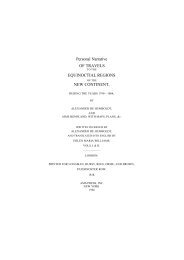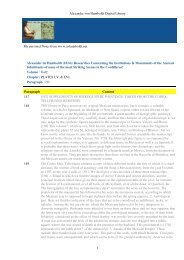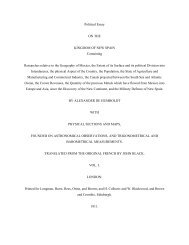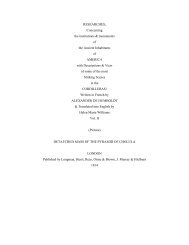See the complete document here
See the complete document here
See the complete document here
Create successful ePaper yourself
Turn your PDF publications into a flip-book with our unique Google optimized e-Paper software.
1 44 COSMOS.<br />
<strong>the</strong> reciprocal reflection of passing events and ancient cosmica)<br />
views, and <strong>the</strong> progressive modification which <strong>the</strong> latter eflccted<br />
in <strong>the</strong>se mythical representations of history. In <strong>the</strong> wanderings<br />
of <strong>the</strong> heroes returning from Troy, Aristonicus makes<br />
Menelaus circumnavigate Africa more than five hundred years<br />
before Neco sailed from Gadeira to India.*<br />
At <strong>the</strong> period which we are <strong>here</strong> considering, of <strong>the</strong> history<br />
of Greece before <strong>the</strong> Macedonian expeditions into Asia, <strong>the</strong>re<br />
occurred three events which exercised a special influence in<br />
extending <strong>the</strong> views of <strong>the</strong> Greeks regarding <strong>the</strong> universe.<br />
These events v/ere <strong>the</strong> attempts to penetrate beyond <strong>the</strong> basin<br />
of <strong>the</strong> Mediterranean toward <strong>the</strong> east <strong>the</strong> ; attempts toward<br />
<strong>the</strong> WTst and <strong>the</strong> establishment of numerous ; colonies from<br />
<strong>the</strong> Pillars of Hercules to <strong>the</strong> nor<strong>the</strong>astern extremity of <strong>the</strong><br />
Euxine, which, by <strong>the</strong> more' varied form of <strong>the</strong>ir political constitution,<br />
and by <strong>the</strong>ir fur<strong>the</strong>rance of mental cultivation, were<br />
more influential than those of <strong>the</strong> Phoenicians and Carthaginians<br />
in <strong>the</strong> ^gean Sea, Sicily, Theria, and on <strong>the</strong> north<br />
and west coasts of Africa.<br />
The advance toward <strong>the</strong> East, about tv\'elve centuries be<br />
fore our era, or one hundred and fifty years after Rameses<br />
Miamoun (Sesostris), is known in history as <strong>the</strong> expedition<br />
of <strong>the</strong> Argonauts to Colchis. The true version of this event,<br />
which is clo<strong>the</strong>d in a mythical garb, and concealed under a<br />
blending of ideal images, is simply <strong>the</strong> fulfillment of a national<br />
desire to open <strong>the</strong> inhospitable Euxine. The myth of Prome<strong>the</strong>us,<br />
and <strong>the</strong> unbinding of <strong>the</strong> fire-kindling Titan on <strong>the</strong><br />
Caucasus by Hercules, during his expedition to <strong>the</strong> East <strong>the</strong><br />
;<br />
ascent of lo from <strong>the</strong> Valley of <strong>the</strong> Hybritcsf to <strong>the</strong> heights<br />
<strong>the</strong> myth of Phryxus and Helle, all indicate<br />
of <strong>the</strong> Caucasus ;<br />
*<br />
Strabo, lib. i., p. 38, Casaub.<br />
t Probably <strong>the</strong> Valley of <strong>the</strong> Don or of <strong>the</strong> Kuban. <strong>See</strong> my Asie Centrale,<br />
t. ii., j). 164. P<strong>here</strong>cydes expressly says {Fragm. 37, ex ScJiol.<br />
Apollon., ii., 1214) that <strong>the</strong> Caucasus burned, and that, <strong>the</strong>refore, Typhon<br />
fled to Italy ; a notice from which. Klausen, in <strong>the</strong> work already<br />
mentioned, s. 298, explains <strong>the</strong> ideal, relation of <strong>the</strong> " fire-kindler"<br />
{TtvpKaEvq), Prome<strong>the</strong>us, to <strong>the</strong> burning mountain. Although <strong>the</strong> geogiiostical<br />
constitution of <strong>the</strong> Caucasus (which has been recently so ably<br />
investigated by Abich), and its connection with <strong>the</strong> volcanic chain of<br />
<strong>the</strong> Thianschan, in <strong>the</strong> interior of Asia (which I think I have shown in<br />
my Asie Centrale, t. ii., p. 55-59), render it in no way imjirobable that<br />
reminiscences of great volcanic eruptions may have been preserved in<br />
<strong>the</strong> Host ancient traditions of men, yet we may ra<strong>the</strong>r assume that a<br />
bold and somewiiat hazardous spirit of etymological conjecture may<br />
have led <strong>the</strong> Greeks to <strong>the</strong> hypo<strong>the</strong>sis of <strong>the</strong> burning. On <strong>the</strong> Sanscrit<br />
etymologies of GraucHsus (or shining mountain), see Bohlen's and Bur<br />
nnnf's statementf in my Asie Centrale, t. i., p. 109
















